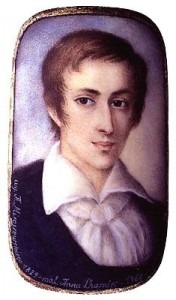 “Minors of the Majors” invites you to discover compositions by the great classical composers that for one reason or another have not reached the musical mainstream. Please enjoy, and keep listening!
“Minors of the Majors” invites you to discover compositions by the great classical composers that for one reason or another have not reached the musical mainstream. Please enjoy, and keep listening!
Unless your name is Mozart, Mendelssohn or Korngold, the first compositional steps are always the hardest. Chopin was probably no older than 14 when he set to work on a set of variations for piano and flute. Already in love with opera, he decided on the happy- ending aria, “Non più mesta” (No longer sad) from Rossini’s opera Cinderella. As the curtain comes down, Cinderella gleefully warbles, “No longer sad beside the fire shall I sit alone, singing; my long years of heartache were but a streak of lightning, a dream, a game.” We are unsure what actually prompted Chopin to select this for his unique combination of flute and piano, but it was most likely written for the composer’s father who was a capable amateur flute player. In the end, the piece was probably dedicated to Józef Cichowski, a close friend of his fathers and an amateur flautist as well. We are indeed fortunate that this early piece of Chopin juvenilia has actually survived, as Jozef Nowakowski, one of the composer’s friends, kept the single manuscript copy as a memento. For one reason or another, the work did not appear in print until 1953.This charming and fluent set of variations presents the theme and four decorated versions of the original tune. Added triplet figuration enlivens the first variation, while the second relies on a florid bel canto style to embellish the theme. Rapid downward arpeggios propel variation three, and the concluding variant displays rapid staccato figuration. Stylistically, there is nothing in this composition to suggest Chopin’s hand. You certainly won’t hear Chopin’s fingerprint in the piano part, as all the interesting bits are given to the flute. In addition, it’s the only Chopin piano part that can comfortably be played by most amateurs. Clearly, the future poet of the piano had a long way to go!
Frédéric Chopin: Variations on a Theme by Rossini
You May Also Like
- Minors of the Majors
Francis Poulenc: Sonata for Trumpet, Horn and Trombone, Op.33 Jean Cocteau magnanimously announced in 1918, that his principal goal was the elimination of all foreign and specifically German elements from French music and culture. - Minors of the Majors
Franz Liszt: Cantantibus organis The 1860’s were not particularly kind to Franz Liszt. For one, the Tsar of Russia successfully blocked his long-awaited marriage to the Princess Carolyne Sayn-Wittgenstein. - Minors of the Majors
Gustav Mahler: Piano Quartet in A Minor Gustav Mahler, son of an aspiring tavern proprietor and a soap-maker’s daughter, was considered a Wunderkind! - Minors of the Majors
Gioacchino Rossini: 3 Choeurs Religieux In 1829, Gioachino Rossini (1792-1868) completed his thirty-fourth opera, William Tell.
More Anecdotes
-
 Haydn’s “Ox Minuet” A butcher, his daughter's wedding, and a composer's unexpected reward
Haydn’s “Ox Minuet” A butcher, his daughter's wedding, and a composer's unexpected reward - Composers in the Courtroom
Lully versus Guichard Louis XIV's favorite musician had a dark side! - Food for Thought
Mealtime with Leopold Mozart Did you know Leopold Mozart was as critical of food as he was of music? - Movers and Shakers
Giulio Gatti-Casazza (1869-1940) Discover how Giulio Gatti-Casazza transformed the Metropolitan Opera!

